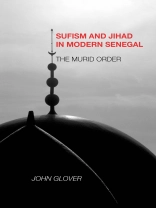Examines through the use of Murid oral and written sources the creation of an ‘alternative modernity’ as an understanding of historical change by Sufi notables and disciples.
The Murid order, founded in Senegal in the latter decades of the nineteenth century, grew into a major Sufi order during the colonial period and is now among the most recognizable of the Sufi orders in Africa. Murids have spread the voice of Islam and Africa in concert halls and on the airwaves through pop singers — especially Youssou N’Dour — and the image of Shaykh Amadu Bamba M’Backé, the founding saint of the order, often used to grace the covers ofworks concerning Islam, African culture, abolition, and European colonization.
In this insightful and revealing study, John Glover explores the manner in which a Muslim society in West Africa actively created a conception ofmodernity that reflects its own historical awareness and identity. Drawing from Murid written and oral historical sources, Glover carefully considers how the Murid order at the collective and individual levels has navigated the intersection of two major historical forces — Islam, specifically in the contexts of reform and mysticism, and European colonization — and achieved in the process an understanding of modernity not as an unwilling witness but as anactive participant. Ultimately,
Sufism and Jihad in Modern Senegal presents the reader with a new portrait of a society that has used its notion of modernity to adapt and incorporate further historical changes into its identity as an African Sufi order.
John Glover is Associate Professor of History at the University of Redlands in southern California.
Inhoudsopgave
Sociopolitical Change, Islamic Reform, and Sufism in West Africa
Conflict and Colonization: A New Generation of Sufi Reformers
The Construction of the Murid Synthesis: Perceptions of Amadu Bamba and Maam Cerno
Translating the Murid Mission: The Founding of Darou Mousty
Symbiosis: Colonization and Murid Modernity
Murid Taalibe: Historical Narratives and Identity







![Hoes van Brian Schrag & Julisa Rowe: Community Arts for God's Purposes [Chinese] 貼近神心意的社群藝術 Hoes van Brian Schrag & Julisa Rowe: Community Arts for God's Purposes [Chinese] 貼近神心意的社群藝術](https://static.worldofdigitals.com/thumb_webp/740/9781645083740.webp)




